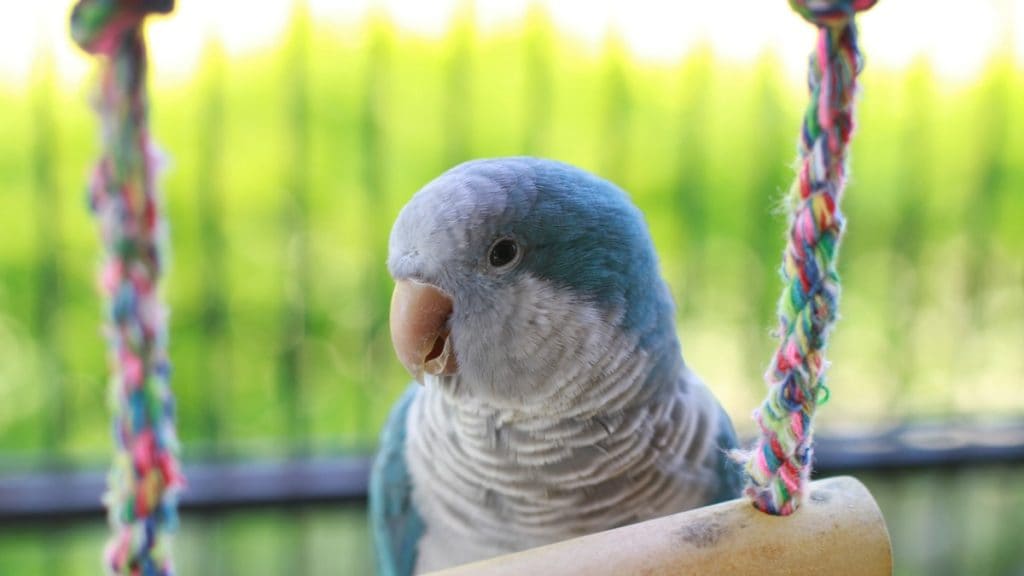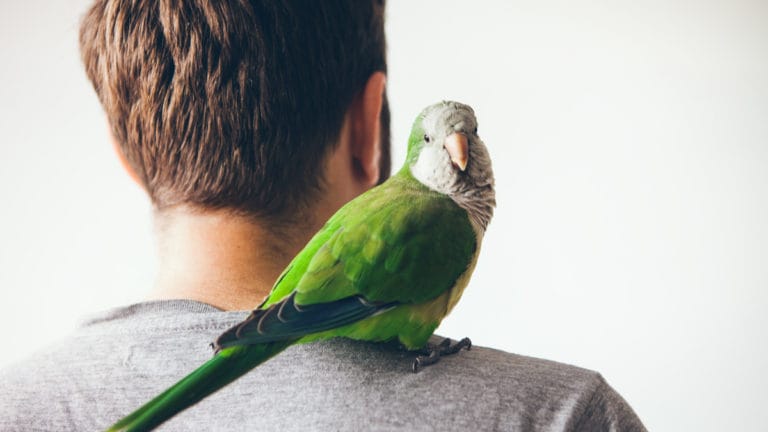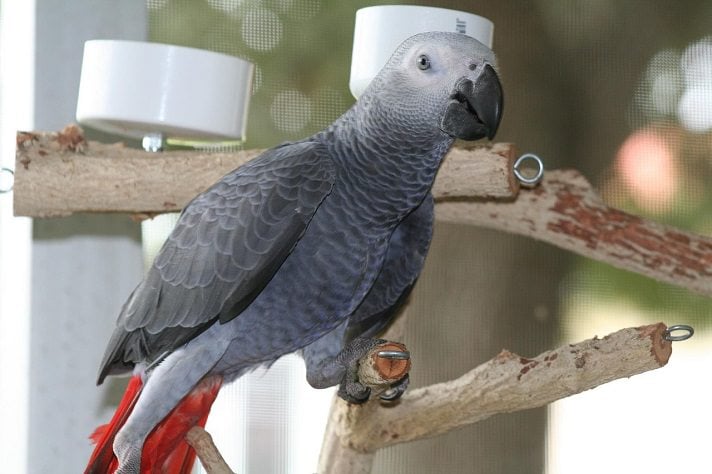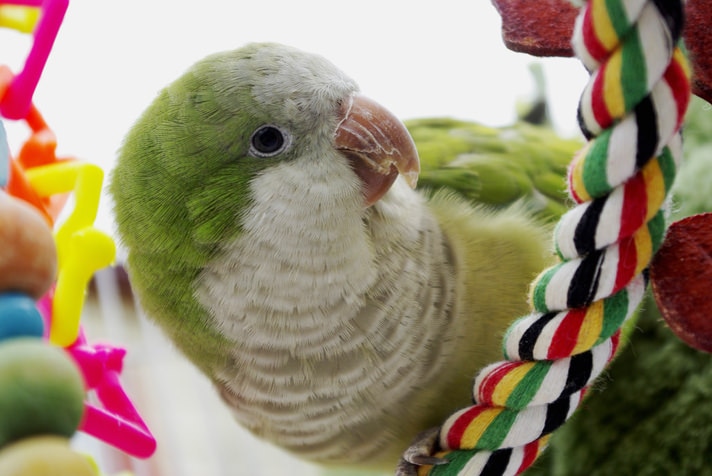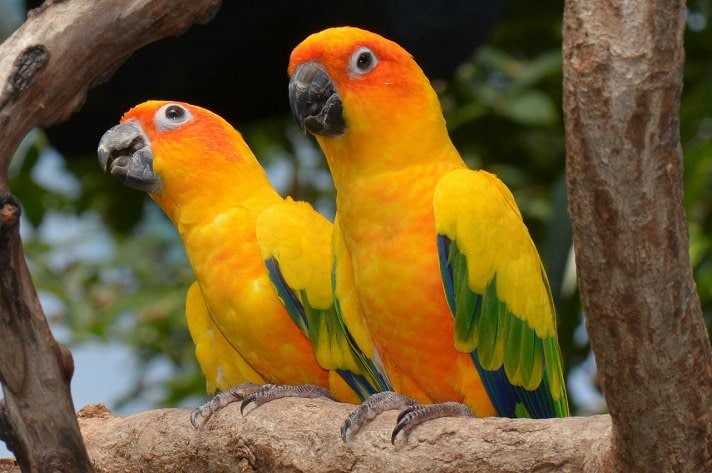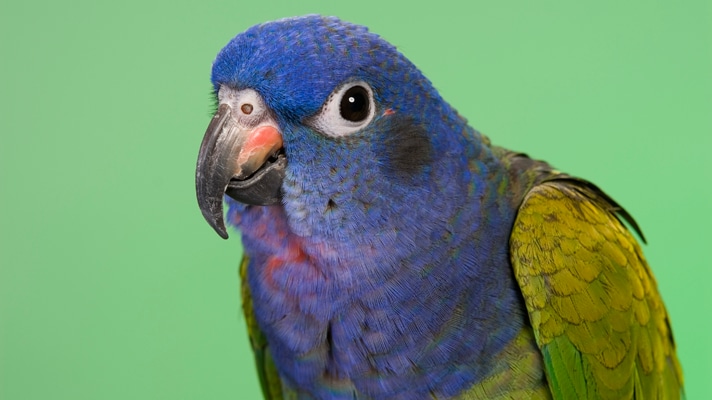The Quaker parrot is an intelligent, engaging bird species, and these hardy birds have adapted well to city life across the United States. Unfortunately, their popularity has placed them at odds with utility companies and agricultural officials, and several state legislatures have responded by making it illegal to have Quaker parrots as pets.
Before getting a Quaker parrot, you need to know where your state stands on the issue. Read on to understand what a Quaker parrot is, why they’re illegal in some states, which states allow Quaker parakeet as pets and other important aspects to consider before getting one.
What is a Quaker Parrot?
The Quaker parrot, commonly referred to as the Quaker parakeet and Monk parrot (and Myiopsitta Monachus in scientific circles), is smaller than a pigeon and larger than a sparrow, says Stephen Baldwin, owner of BrooklynParrots.com, a site launched in 2005 to share information about the wild Quaker Parrots of Brooklyn, New York.
“Its bright green coloration, with blue feathers only visible in flight, make its appearance startling in urban areas,” Baldwin says.
Though they’re native to South America, primarily Argentina, the Quaker parakeet has adapted to life in cities across the United States, including Chicago and New York City.
“Their natural habitat has the same four seasons that we experience in North America,” Baldwin says. “So when the Quakers started showing up here back in the 60s and 70s, they didn’t have to adjust much.”
Quakers became increasingly popular as pets into the 1980s, says Janet Trumbule, executive director of administration for Oasis Sanctuary, a nonprofit avian welfare organization in Scottsdale, Arizona.
“It is likely that the naturalized flocks grew from pets that had escaped or intentionally been released,” she says. “This is all too common when owners don’t want their bird any longer.”
Why Are Quaker Parrots Illegal in Some States?
Enthusiasm for wild Quaker parrots is mixed.
“Some people find them a nuisance while others love, cherish and protect the flocks,” Trumbule says.
Quakers use their strong skills to build nests near utility poles and transformers, which creates potential fire hazards. Some agriculturists see Quakers as a threat to the environment, but those intimate with the species say these concerns are largely unfounded and outdated.
“Great fears shadowed the parrots when they first appeared here,” Baldwin says. “Many feared that turned loose, they could decimate agriculture [and] populations could explode. ”
Baldwin admits there are legitimate concerns associated with releasing any non-native species into the environment, but he doesn’t believe the Quaker parrot falls into this category.
“To some, they might represent a mild nuisance—they’re loud, and you’d be a fool to park your car under one of their nests—but they’re not going to wreck the local environment,” he says. “They don’t bother other birds, at least I’ve never seen this.”
States that have banned Quaker parrots as pets are California, Colorado (unless owned before 1990), Connecticut, Georgia, Hawaii, Kentucky, Pennsylvania, Rhode Island, Tennessee and Wyoming, according to the Quaker Parakeet Society (QPS.) Once legal in Maine, the state’s legislature voted to prohibit them about two years ago, says Sheila Blanchette, a rehome assistance and possibilities program chairperson with QPS.
“If you have a Quaker parrot in a state where prohibited, you run the risk of authorities euthanizing her,” says Blanchette, an IAABC certified parrot behavior consultant and owner of Heart of Feathers Education LLC in Haverhill, Massachusetts. “If the person is going to ignore the law to have the bird, they will not be able to bring the Quaker parakeet to a local avian vet in the state.”
Where Can You Own a Quaker Parrot?
It’s legal to adopt a Quaker parrot in most states, although some of these carry restrictions. Laws are subject to change, so keep current with your state’s legislation before considering adoption. QPS provides this list:
Alabama: Quaker parrots are legal with no restrictions.
Alaska: Quaker parrots are legal with no restrictions.
Arizona: Quaker parrots are legal with no restrictions.
Arkansas: Quaker parrots are legal with no restrictions.
Delaware: Quaker parrots are legal with no restrictions.
Florida: Quaker parrots are legal with no restrictions.
Idaho: Quaker parrots are legal with no restrictions.
Illinois: Quaker parrots are legal with no restrictions.
Indiana: Quaker parrots are legal with no restrictions.
Iowa: Quaker parrots are legal with no restrictions.
Louisiana: Quaker parrots are legal with no restrictions.
Maryland: Quaker parrots are legal with no restrictions.
Massachusetts: Quaker parrots are legal with no restrictions.
Michigan: Quaker parrots are legal with no restrictions.
Minnesota: Quaker parrots are legal with no restrictions.
Mississippi: Quaker parrots are legal with no restrictions.
Missouri: Quaker parrots are legal with no restrictions.
Montana: Quaker parrots are legal with no restrictions.
Nebraska: Quaker parrots are legal with no restrictions.
Nevada: Quaker parrots are legal with no restrictions.
New Hampshire: Quaker parrots are legal with no restrictions.
New Jersey: Legal with a permit that the New Jersey Division of Fish & Wildlife will issue at its discretion “only after a clear showing that the criteria for the possession of such potentially dangerous species have been met.”
New Mexico: Quaker parrots are legal with no restrictions.
New York: Legal, but Quakers (as well as all companion birds) must be banded if sold by or boarded at a pet shop.
North Carolina: Quaker parrots are legal with no restrictions.
North Dakota: Quaker parrots are legal with no restrictions.
Ohio: Legal, but their wings must be clipped.
Oklahoma: Quaker parrots are legal with no restrictions.
Oregon: Quaker parrots are legal with no restrictions.
South Carolina: Quaker parrots are legal with no restrictions.
South Dakota: Quaker parrots are legal with no restrictions.
Texas: Quaker parrots are legal with no restrictions.
Utah: Quaker parrots are legal with no restrictions.
By Dr. Sarah Wooten and Helen Jablonski
Featured Image: via iStock.com/jayjayoo7_com
Share:
